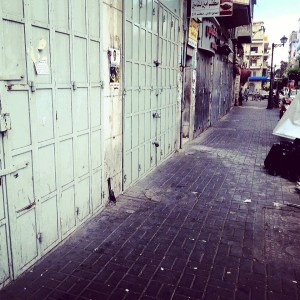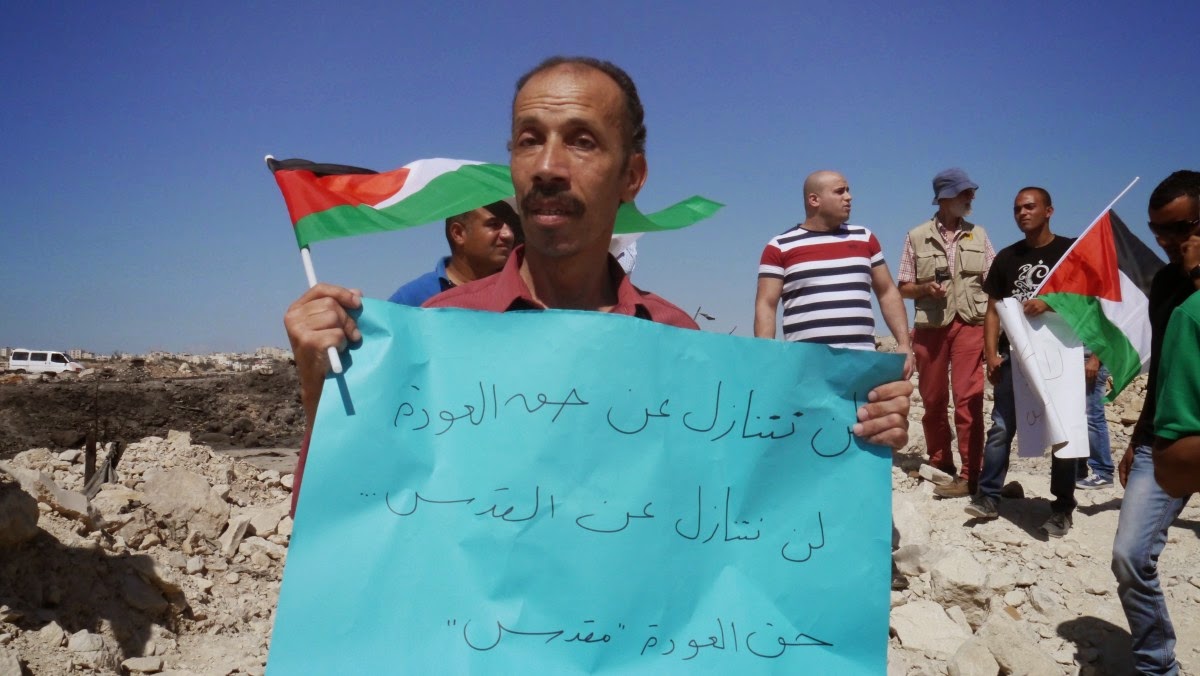Taking a step away from my normal blog, I come to tell a story. It's not one about somebody famous, or even one that will be seen as very important, but for the people involved it is their life.
Many of you who read this come from families much like my own, in houses that we've made homes and in communities we feel safe. We live each day to gradually leave these homes to build new ones and make new families. I have felt the pressure of my future not knowing how, someday I will afford to buy a house of my own. What I do know is that, when I work hard and save for maybe years on end, I will have the reward. So I ask those of you who are enjoying that prize or who have started that dreadful saving process, what would you do if one night the army told you to get outside and bulldozed half of your beautiful home? This is exactly what happened to a couple of families last night and unlike most western families, this family can't rely on their parents for emergency resort as the homes often contain their parents too .
.
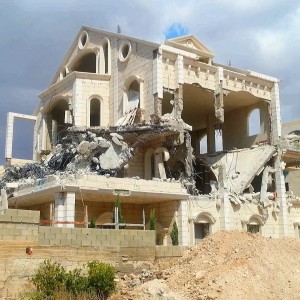 .
.
I tried to find out more about the house and even went to visit it. You could still see the shadow of what was obviously a beautiful home only hours before. Apparently this wasn't the first time, not the first person to have suffered in this way.
In 2001 Israelis started to build the wall, the wall which cages Palestinians in like animals. The wall has many watch towers for Israelis to monitor and a few checkpoints which tracks Palestinians movements and stops their rights of moving out of the West Bank freely. Like a hunter, they prayed on Palestinians to keep them in line and remind them of the power they have.
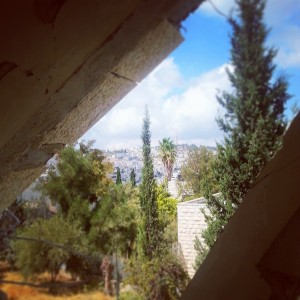 From what I have gauged the owner of the land had his house demolished not long after the wall was built as it was too close. The man then rebuilt his house and rented the first floor to a family. It must have been a masterpiece and, from the upper floors, he could probably had a beautiful view over the wall to Jerusalem. Unfortunately for the man, right on the opposite side of the wall was a tall hotel whose top floor had been snatched by the parasitic Israeli army to make a watchtower. Resembling a hawk, they glared down from their comfortable nesting place, spreading fear in the people below.
From what I have gauged the owner of the land had his house demolished not long after the wall was built as it was too close. The man then rebuilt his house and rented the first floor to a family. It must have been a masterpiece and, from the upper floors, he could probably had a beautiful view over the wall to Jerusalem. Unfortunately for the man, right on the opposite side of the wall was a tall hotel whose top floor had been snatched by the parasitic Israeli army to make a watchtower. Resembling a hawk, they glared down from their comfortable nesting place, spreading fear in the people below.
Like rouge animals they watched, waiting to one day claim the  Palestinian territory. They look upon the lesser people and sometimes pounce to remind them how savage they can really be. These poor families felt their claws as the beasts had ripped into the home they had built. Even from our house we had heard rubber bullets being fired and bangs which we now know to have been memories being buried under the stones that had once made them feel safe.
Palestinian territory. They look upon the lesser people and sometimes pounce to remind them how savage they can really be. These poor families felt their claws as the beasts had ripped into the home they had built. Even from our house we had heard rubber bullets being fired and bangs which we now know to have been memories being buried under the stones that had once made them feel safe.
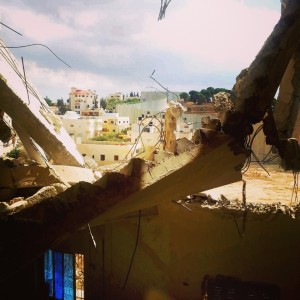 Palestinian territory. They look upon the lesser people and sometimes pounce to remind them how savage they can really be. These poor families felt their claws as the beasts had ripped into the home they had built. Even from our house we had heard rubber bullets being fired and bangs which we now know to have been memories being buried under the stones that had once made them feel safe.
Palestinian territory. They look upon the lesser people and sometimes pounce to remind them how savage they can really be. These poor families felt their claws as the beasts had ripped into the home they had built. Even from our house we had heard rubber bullets being fired and bangs which we now know to have been memories being buried under the stones that had once made them feel safe.
The army claimed that the house was 'a threat to security,' translated it meant it was in their way, either too close to the wall or blocking their view. For the university music professor who  owned the house, he saw his hard work crumble. For the timid family who trembled with each hit of the bulldozer, they returned in the early hours to what was left of their lives. With nowhere else to go, they must try to pick up the destruction left behind from the furious monsters that sought them down in the night.
owned the house, he saw his hard work crumble. For the timid family who trembled with each hit of the bulldozer, they returned in the early hours to what was left of their lives. With nowhere else to go, they must try to pick up the destruction left behind from the furious monsters that sought them down in the night.
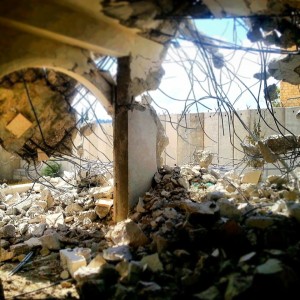 owned the house, he saw his hard work crumble. For the timid family who trembled with each hit of the bulldozer, they returned in the early hours to what was left of their lives. With nowhere else to go, they must try to pick up the destruction left behind from the furious monsters that sought them down in the night.
owned the house, he saw his hard work crumble. For the timid family who trembled with each hit of the bulldozer, they returned in the early hours to what was left of their lives. With nowhere else to go, they must try to pick up the destruction left behind from the furious monsters that sought them down in the night.
These people constantly find themselves working for things to only have them brutally taken from them. The communities try to protest but their chants fall on deaf ears. They can't fight as they are boxed in by the army who could crush them so easily. They can't gain power because everything they own is processed through Israeli checks meaning electricity, to stop them becoming more  technically advanced, their productions - most are Israeli made goods meaning they can't earn more money and water supply so that Palestinians rely completely on the Israelis. How would you fight when nobody comes to help?
technically advanced, their productions - most are Israeli made goods meaning they can't earn more money and water supply so that Palestinians rely completely on the Israelis. How would you fight when nobody comes to help?
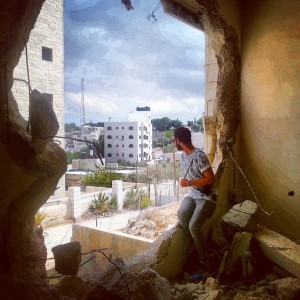 technically advanced, their productions - most are Israeli made goods meaning they can't earn more money and water supply so that Palestinians rely completely on the Israelis. How would you fight when nobody comes to help?
technically advanced, their productions - most are Israeli made goods meaning they can't earn more money and water supply so that Palestinians rely completely on the Israelis. How would you fight when nobody comes to help?
Things like this happen every day and people aren't surprised anymore, it's unacceptable! Keep the stories spreading, let us not become remiss in our duties to do whats right because we've become too complacent that it would never happen to us.
First They Came For The Communists
Written by Martin Niemoller
First they came for the Communists,
and I didn’t speak up,
because I wasn’t a Communist.
Then they came for the Jews,
and I didn’t speak up,
because I wasn’t a Jew.
Then they came for the Catholics,
and I didn’t speak up,
because I was a Protestant.
Then they came for me,
and by that time there was
no one left to speak up for me.


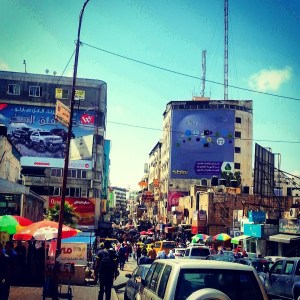 mallah, 10km north of Jerusalem and currently serving as the de facto administrative capital of the State of Palestine, also the place I just spent the last couple of days exploring. Occupying one of their bright, yellow minibuses, we traveled 1 hour from our new home to arrive in the bustling city. The extensive amount of energy hit me the moment the bus doors opened, spreading
mallah, 10km north of Jerusalem and currently serving as the de facto administrative capital of the State of Palestine, also the place I just spent the last couple of days exploring. Occupying one of their bright, yellow minibuses, we traveled 1 hour from our new home to arrive in the bustling city. The extensive amount of energy hit me the moment the bus doors opened, spreading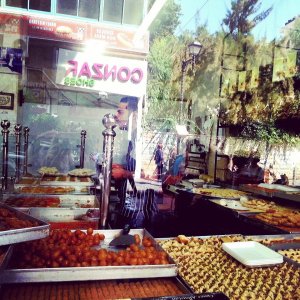
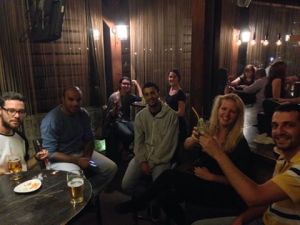 g was new and exciting. We followed the days antics by heading to a local bar, yes BAR! As Ramallah is a city, they are more receptive to western cultures and things they would class as haram (bad). Of course the bars were run by Christians but that was only possible as Ramallah holds a large portion of Romania's Christian population. It was a truly pleasant evening bonding us Brits and our local colleagues in a multi-cultural environment, alcohol, shisha and good music!
g was new and exciting. We followed the days antics by heading to a local bar, yes BAR! As Ramallah is a city, they are more receptive to western cultures and things they would class as haram (bad). Of course the bars were run by Christians but that was only possible as Ramallah holds a large portion of Romania's Christian population. It was a truly pleasant evening bonding us Brits and our local colleagues in a multi-cultural environment, alcohol, shisha and good music!